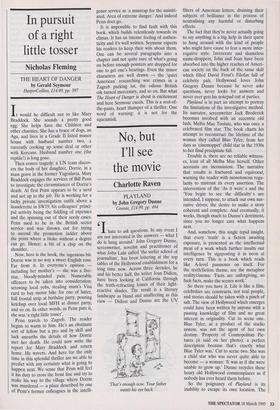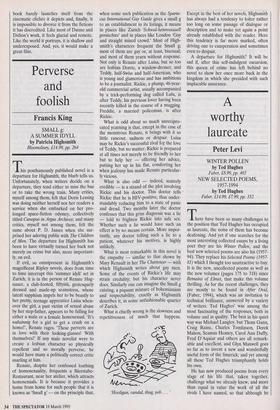No, but I'll see the movie
Charlotte Raven
PLAYLAND by John Gregory Dunne Granta, £14.99, pp. 494 Ihate to ask questions. In any event I am not interested in the answers — what I do is hang around.' John Gregory Dunne, screenwriter, novelist and practitioner of what John Lahr called 'the surfer school of journalism', has been loitering at the top tables of the Hollywood establishment for a long time now. Across three decades, he and his better half, the writer Joan Didion, have been looking at California through the truth-refracting lenses of their light- reactive shades. The result is a literary landscape as bland and unaffecting as this view — Didion and Dunne are the UV `That's enough now. Your father wants his eye back' filters of American letters, draining their subjects of brilliance in the process of neutralising any harmful or disturbing effects.
The fact that they're never actually going to say anything is a big help in their quest to hang around with the kind of people who might have cause to fear a more inter- rogative style. Inveterate and shameless name-droppers, John and Joan have been absorbed into the higher reaches of Ameri- can society on the back of the same skill which filled David Frost's Filofax full of celebrity pals. Hollywood loves John Gregory Dunne because he never asks questions, never looks for answers and never ever gets his notepad out at parties.
Playland is in part an attempt to portray the limitations of the investigative method. Its narrator, screenwriter Jack Broderick becomes involved with an eccentric old lush, Melba Mae Toolate, who was once a celebrated film star. The book charts his attempt to reconstruct the lifetime of the woman they called Blue Tyler, from her days as `cinemoppet' child star in the 1930s to her final precipitate fall.
Trouble is, there are no reliable witness- es, least of all Melba Mae herself. Other accounts are inconsistent. The narrative that results is fractured and equivocal, warning the reader with monotonous regu- larity to mistrust its every assertion. The intervention of the 'As it were' s and the `You begin to see the difficulty' s are intended, I suppose, to attack our own nar- rative drives; the desire to make a story coherent and complete. And eventually, it works, though much to Dunne's detriment, since you no longer care what happens next.
And, somehow, this single tepid insight, that every 'truth' is a fiction awaiting exposure, is presented as the intellectual meat of a work which further insults our intelligence by signposting it in neon at every turn. This is a book which reads like A-level passnotes on itself. For the truth/fiction theme, see the metaphor reality/cinema: 'Facts are unforgiving, so fuck facts, make the scenes work.'
So there you have it. Life is like a film, celebrities are constructs, not real people, and stories should be taken with a pinch of salt. The view of Hollywood which emerges could have been written by anyone with a passing knowledge of film and no great interest in originality. Cut to scene one. Blue Tyler, as a product of the studio system, was not the agent of her own destiny: 'Property of Cosmopolitan Pic- tures (it said on her photo): a perfect description because that's exactly what Blue Tyler was.' Cut to scene two. She was a child star who was never quite able to become — a woman: 'It was as if she were unable to grow up.' Dunne recycles these hoary old Hollywood commonplaces as if nobody has ever heard them before.
So the poignancy of Playland is its inability to escape its own location. The book barely launches itself from the cinematic clichés it depicts and, finally, it is impossible to divorce it from the fictions it has discredited. Like most of Dunne and Didion's work, it feels glacial and remote. Like the world it portrays, it is shallow and underexposed. And, yes, it would make a great film.



























































 Previous page
Previous page